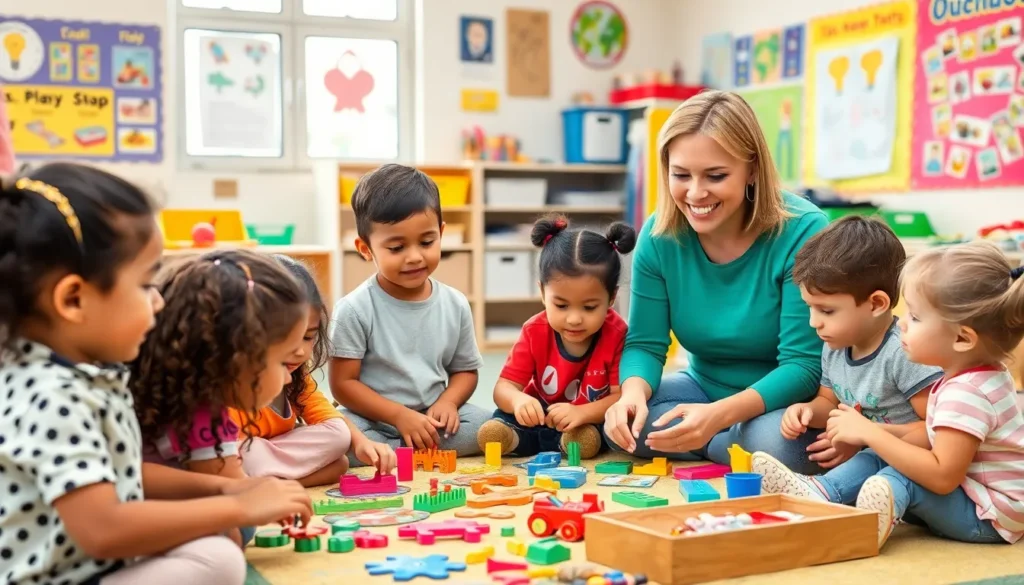Table of Contents
ToggleIn today’s fast-paced world, early childhood education is more crucial than ever. It’s not just about teaching kids their ABCs and 123s; it’s about setting the stage for lifelong learning and social skills. Imagine a place where tiny hands create masterpieces and little minds explore the wonders of the universe—yes, that’s happening in preschools everywhere!
Understanding Early Childhood Education Today
Early childhood education incorporates a comprehensive approach that nurtures developmental milestones. It emphasizes social, emotional, cognitive, and physical growth in children from birth to age eight. Supporting the development of critical thinking and problem-solving skills plays a vital role in preparing children for future academic success.
Learning environments prioritize active engagement and exploration. Children participate in hands-on activities that spark curiosity and encourage creativity. These experiences rank high in importance as they help develop essential life skills, such as communication and collaboration.
Preschools often implement playful pedagogies to foster a love for learning. Programs utilize play-based learning, which has been shown to enhance children’s motivation and enjoyment of educational activities. Research indicates that children exposed to play-based models demonstrate improved outcomes in various skills compared to those in more traditional settings.
Teacher involvement significantly affects the quality of early childhood education. Educators who create supportive and stimulating environments contribute to children’s overall development. Professional training ensures educators apply best practices, including recognizing individual learning styles and adapting activities accordingly.
Finally, parental involvement remains a crucial factor. Engaging parents in the educational process strengthens the partnership between home and school. Programs that include family engagement initiatives promote a consistent learning framework, enhancing children’s educational experiences.
The Importance of Early Childhood Education

Early childhood education plays a vital role in shaping young minds. It encompasses more than academic skills, focusing on development across critical areas.
Cognitive Development
Cognitive development in early childhood is essential for a child’s overall growth. Engaging in activities like puzzles and problem-solving tasks enhances cognitive skills. Experiences during this stage stimulate brain development and promote critical thinking. Research indicates that children exposed to diverse learning activities demonstrate increased focus and better memory retention. Additionally, integrating technology in learning can support cognitive growth when used wisely. Early exposure to reading material also boosts vocabulary and language skills, laying a strong foundation for future academic success.
Social Skills Development
Social skills development is crucial for children’s interactions and relationships. Through structured play, children learn essential skills like sharing, cooperation, and empathy. Activities that involve group settings foster communication and teamwork. Participating in these experiences early on encourages children to navigate social dynamics effectively. Moreover, positive interactions with peers build confidence and reduce anxiety in social situations. Early childhood education programs prioritizing social learning enhance a child’s ability to form meaningful connections, which is vital for their personal and academic journeys.
Current Trends in Early Childhood Education
Early childhood education adapts to modern society’s needs, embracing innovative methodologies that enhance children’s learning experiences.
Technology Integration
Technology integration in early childhood education expands learning opportunities. Educators utilize interactive tools and digital resources to engage children more effectively. Tablets, educational apps, and online platforms encourage exploration and motivate young learners. Research underscores the importance of appropriate technology use, stating that it can supplement traditional educational methods. Children exposed to technology show improved cognitive skills and greater adaptability in learning environments. Educators emphasize that guidance is critical, ensuring technology serves as a complement rather than a distraction. Additionally, technology helps bridge communication gaps between teachers and parents, fostering a collaborative approach to education.
Play-Based Learning
Play-based learning serves as a cornerstone of early childhood education. It cultivates children’s natural curiosity through fun and engaging activities. Research highlights that children in play-based settings demonstrate superior problem-solving skills and creativity. Educators design lessons that incorporate structured playtime, allowing children to explore concepts at their own pace. Such experiences promote not only academic success but also emotional and social development. Through interaction with peers during play, children learn vital social skills like teamwork and empathy. Consequently, schools that prioritize play-based learning create a positive atmosphere that enhances the overall educational experience.
Challenges Facing Early Childhood Education Today
Early childhood education faces numerous challenges that affect its effectiveness and accessibility. Funding issues and teacher training play critical roles in shaping the quality of education provided to young children.
Funding and Resources
Funding shortages pose significant barriers for early childhood education programs. Many schools lack adequate resources for materials needed in play-based learning environments. Government initiatives often fall short, leaving institutions to rely on private donations or tuition fees. Resource allocation varies widely by region, affecting the quality of education children receive. Under-funded programs struggle to hire qualified staff or maintain facilities. These limitations can hinder children’s development, impacting their readiness for future academic success.
Teacher Training and Retention
Teacher training proves vital for creating effective learning environments. Many educators in early childhood settings lack sufficient professional development opportunities. Ongoing training enhances teachers’ skills in implementing best practices and addressing diverse learning styles. Retention remains a challenge, with turnover rates affecting consistency in education. Supportive work environments lead to higher job satisfaction among educators. Programs designed to foster collaboration and mentorship can improve retention rates. Investing in teacher training positively impacts children’s learning experiences and developmental outcomes.
Early childhood education today is a dynamic and essential component of a child’s development. By prioritizing play-based learning and fostering strong social skills, it sets the foundation for lifelong success. The integration of technology and active engagement in learning environments further enriches children’s experiences.
However, challenges such as funding and teacher training must be addressed to ensure quality education remains accessible. As society continues to recognize the importance of early childhood education, investing in resources and professional development will be crucial for nurturing the next generation. The commitment to enhancing early education will ultimately shape a brighter future for children and their communities.







